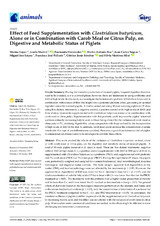Effect of Feed Supplementation with Clostridium butyricum, Alone or in Combination with Carob Meal or Citrus Pulp, on Digestive and Metabolic Status of Piglets
Autor
López, Marina
Madrid, Josefa
Hernández, Fuensanta
Ros, Martín Antonio
Segura, Juan Carlos
López, Miguel José
Pallarés, F.J.
Sánchez, Cristian Jesús
Martínez-Miró, Silvia
Editor
MDPIFecha
2021Materia
PigletsClostridium butyricum
Carob meal
Citrus pulp
Digestive status
Metabolic status
METS:
Mostrar el registro METSPREMIS:
Mostrar el registro PREMISMetadatos
Mostrar el registro completo del ítemResumen
This work studied the effects of the inclusion of Clostridium butyricum on feed, alone or with carob meal or citrus pulp, on the digestive and metabolic status of weaned piglets. A total of 30 male piglets (weaned at 21 days) is used. There are five dietary treatments: negative without ZnO at high doses (C-), a positive control supplemented with ZnO at 2500 ppm of Zn (C+), supplemented with Clostridium butyricum as a probiotic (PRO), and supplemented with probiotic and 5% carob meal (PROC) or 5% citrus pulp (PROP). During the experiment (27 days), the piglets were periodically weighed and sampled for a serum biochemical, fecal microbiological, intestine histological, and digestive status analysis. The body weight, apparent ileal digestibility of dry matter (DM), and fecal microbiology were not affected by the treatments (p ≥ 0.05). However, the apparent fecal digestibility of DM was lower for the C- treatment than for C+ (p < 0.05), and the total concentration of volatile fatty acids (VFAs) in feces with C+ was lower than that for the PROC treatment (p < 0.05). The treatments with the probiotic had a higher molar proportion of butyric acid in feces than C+, and it was found that C- reached an intermediate value (p < 0.01). No general effects of diet were found on the histological measures performed on the jejunum and ileum, and in the serum biochemical analysis (p ≥ 0.05), only the concentration of interleukin-8 was lower for the PROC treatment compared to the C-, C+, and PRO treatments (p < 0.05). In conclusion, the intestinal wellness of piglets could be improved with the supplementation of Clostridium butyricum by increasing butyric acid, and this effect was not altered with the inclusion of carob meal or citrus pulp. More studies under commercial conditions are needed, as the effects might be different in more challenging environmental circumstances.

